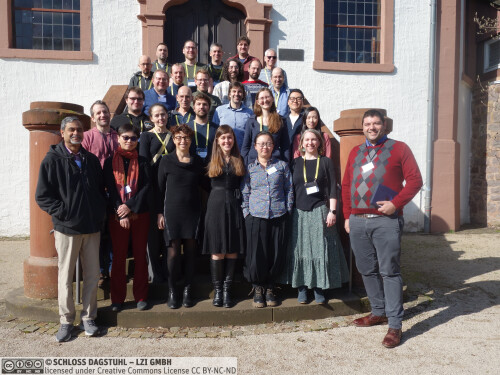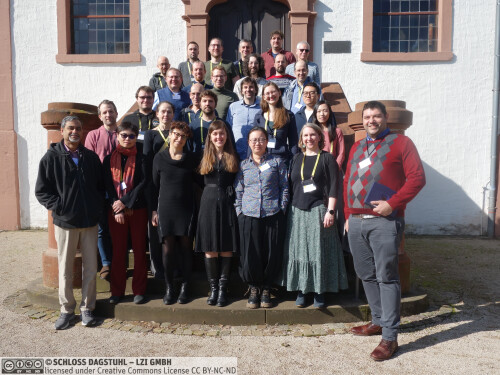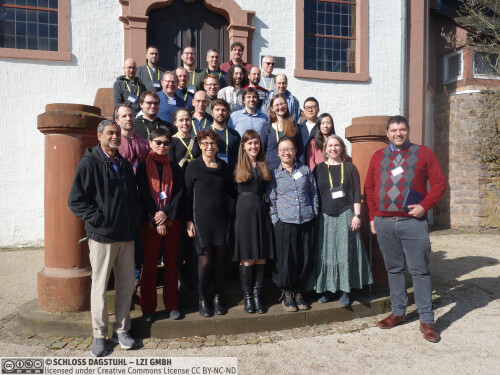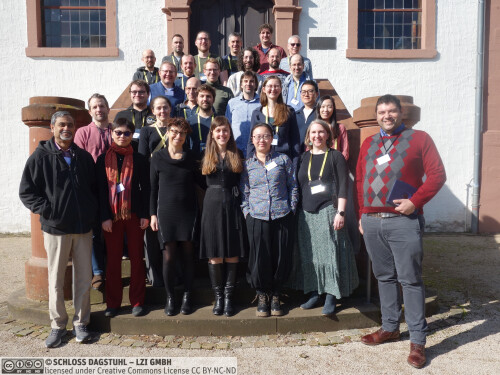Dagstuhl-Seminar 24092
Applied and Combinatorial Topology
( 25. Feb – 01. Mar, 2024 )
Permalink
Organisatoren
- Pawel Dlotko (Polish Academy of Science, PL)
- Dmitry Feichtner-Kozlov (Universität Bremen, DE)
- Anastasios Stefanou (Universität Bremen, DE)
- Yusu Wang (University of California, San Diego - La Jolla, US)
Kontakt
- Andreas Dolzmann (für wissenschaftliche Fragen)
- Christina Schwarz (für administrative Fragen)
Dagstuhl Reports
As part of the mandatory documentation, participants are asked to submit their talk abstracts, working group results, etc. for publication in our series Dagstuhl Reports via the Dagstuhl Reports Submission System.
- Upload (Use personal credentials as created in DOOR to log in)
Dagstuhl Seminar Wiki
- Dagstuhl Seminar Wiki (Use personal credentials as created in DOOR to log in)
Gemeinsame Dokumente
- Dagstuhl Materials Page (Use personal credentials as created in DOOR to log in)
The last twenty years of rapid development of Topological Data Analysis (TDA) have shown the need of understanding the shape of data to better understand the data. Since an explosion of new ideas in 2000’ including those of Persistent Homology and Mapper Algorithms, the community rushed to solve detailed theoretical questions related to the existing invariants. However, topology and geometry have still much to offer to the data science community. New tools and techniques are within reach, waiting to be brought over the fence to enrich our understanding and potential to analyze data.
At the same time, the fields of Discrete Morse Theory (DMT) and Combinatorial Topology (CT) are developed in parallel with no strong connection to data-intensive TDA or to other statistical pipelines (e.g. machine learning).
Our major goal is to soften this strict separation between TDA, CT, and DMT by creating new cross-community connections. We plan to bring together cross-sections of both communities, including researchers with theoretical, applied, and computational backgrounds. Initial speed up of interpersonal communication should result in a significant boost to all the involved areas and even encourage them to search for connections and common ground to create community in-between – transferring ideas, tools and methods.
This Dagstuhl Seminar aims to bring together a number of experts in Discrete Morse Theory, Combinatorial Topology, Topological Data Analysis, and Statistics to (i) enhance the existing interactions between these fields on the one hand, and to (ii) discuss the possibility of adopting new invariants from algebra, geometry, and topology; in particular inspired by continuous and discrete Morse theory and combinatorial topology; to analyze and better understand the notion of shape of the data.
We will start our discussion by understanding interactions of DMT and CT with the current tools of TDA and Statistics, i.e. we will start by examining how to input Mappers into statistical pipelines, study how to define averages and study the limit behavior. Building on this, new possible techniques will be explored and integrated into proper statistical frameworks. We will also discuss how to adopt new invariants from DMT and CT to the setting of TDA and how to input them into Statistics. Possible invariants from DMT and CT to be examined include invariant sets of discrete vector fields and algebraic invariants of (multi-)filtered complexes, respectively. Their stability, robustness and computational complexity will be thoroughly discussed. Lastly, if time permits, we want to test them on a number of sample datasets and compare their efficacy to the already existing tools.
We hope that our seminar in Dagstuhl will provide an interactive environment for the discrete Morse theory, combinatorial topology, and statistics communities that will result in new joint projects and research collaborations in applied topology and data science.
 Pawel Dlotko, Dmitry Feichtner-Kozlov, Anastasios Stefanou, and Yusu Wang
Pawel Dlotko, Dmitry Feichtner-Kozlov, Anastasios Stefanou, and Yusu Wang
- Ulrich Bauer (TU München, DE) [dblp]
- Julian Brüggemann (MPI für Mathematik - Bonn, DE)
- Mathieu Carrière (Centre Inria d'Université Côte d'Azur - Sophia Antipolis, FR)
- Tamal K. Dey (Purdue University - West Lafayette, US) [dblp]
- Pawel Dlotko (Polish Academy of Science, PL) [dblp]
- Dmitry Feichtner-Kozlov (Universität Bremen, DE) [dblp]
- Robert Green (University at Albany, US)
- Teresa Heiss (IST Austria - Klosterneuburg, AT) [dblp]
- Niklas Hellmer (Polish Academy of Science, PL)
- Ingrid Hotz (Linköping University, SE) [dblp]
- Sara Kališnik Hintz (ETH Zürich, CH)
- Michael Kerber (TU Graz, AT) [dblp]
- Woojin Kim (Duke University - Durham, US & KAIST - Daejeon, KR)
- Claudia Landi (University of Modena, IT) [dblp]
- Fabian Lenzen (TU Berlin, DE)
- Michael Lesnick (University at Albany, US) [dblp]
- Roy Meshulam (Technion - Haifa, IL) [dblp]
- Elizabeth Munch (Michigan State University, US) [dblp]
- Tom Needham (Florida State University - Tallahassee, US)
- Martin Raussen (Aalborg University, DK) [dblp]
- Bastian Rieck (Helmholtz Zentrum München, DE) [dblp]
- Nicholas Scoville (Ursinus College - Collegeville, US)
- Jan Felix Senge (Universität Bremen, DE)
- Anastasios Stefanou (Universität Bremen, DE)
- Yusu Wang (University of California, San Diego - La Jolla, US) [dblp]
- Bei Wang Phillips (University of Utah - Salt Lake City, US) [dblp]
- Leonard Wienke (Universität Bremen, DE)
- Ling Zhou (Duke University - Durham, US)
Klassifikation
- Computational Geometry
- Data Structures and Algorithms
- Discrete Mathematics
Schlagworte
- Applied Topology
- Topological Data Analysis
- Discrete Morse Theory
- Combinatorial Topology
- Statistics





 Creative Commons BY 4.0
Creative Commons BY 4.0
